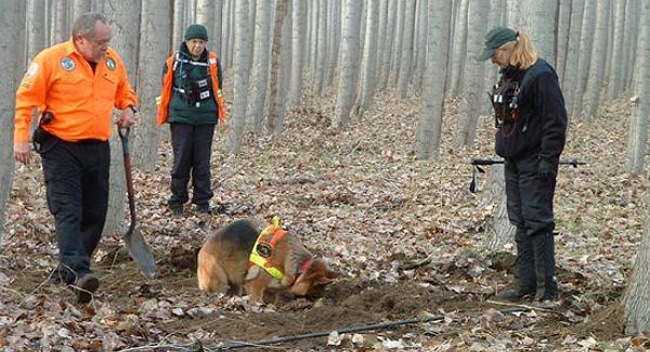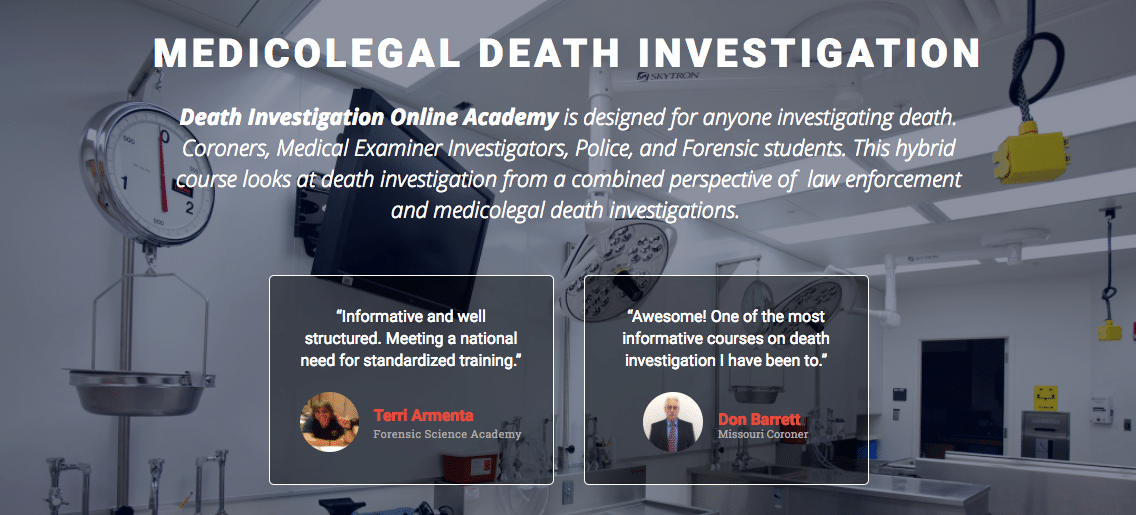 Cadaver dogs. Also known as human remains detection dogs, have been trained to smell death. Specifically, the dogs are trained to smell decomposition, which means they can locate body parts, tissue, blood, and bone
Cadaver dogs. Also known as human remains detection dogs, have been trained to smell death. Specifically, the dogs are trained to smell decomposition, which means they can locate body parts, tissue, blood, and boneA human cadaver dog’s detection skills depend greatly on its training, and the problem is that human remains are hard to come by. Trainers often use a combination of available “pseudoscents”, and pigs. The problem with pseudoscents, says Mick Swindells, a retired police handler who works as a freelance trainer and handler, is that they represent a “snapshot” of death. As decomposition proceeds, the chemistry of the corpse evolves, causing its odor to change. “I’m trying to train a dog to find the whole video, not just a snapshot,” he says. Pigs decompose in similarly to humans, and when buried they disturb the ground in a similar way.
A well-trained cadaver dog almost never gets it wrong, according to experts.
If the dog has the proper training in picking up the full range of scents of human decomposition, his accuracy rate is about 95 percent, said Sharon Ward, a cadaver dog trainer in Portland, Ore.
“So if a dog says it’s there, there’s a darn good chance it is,” she said. “They’re pretty darn accurate.”
Types of search methods
Air-scent dogs, work with their nose in the air. They pick up human scent anywhere in the vicinity — they don’t need a “last seen” starting point, an article to work from or a scent trail, and time is not an issue. Whereas tracking dogs follow a particular scent trail, air-scent dogs pick up a scent carried in air currents and seek out its origin — the point of greatest concentration.
Air-scent dogs might be called in to find a missing hiker located “somewhere in a national park,” an avalanche victim beneath 15 feet of snow or people buried under a collapsed building. Air-scenters might specialize in a particular type of search, such as:
- Cadaver – Dogs specifically search for the scent of human remains, detecting the smell of human decomposition gasses in addition to skin rafts. Cadaver dogs can find something as small as a human tooth or a single drop of blood.
- Water – Dogs search for drowning victims by boat. When a body is underwater, skin particles and gases rise to the surface, so dogs can smell a body even when it’s completely immersed. Due to the movement of water currents, dogs can seldom pinpoint the exact location of the body. Typically, more than one SAR team searches the area of interest, and divers use each dog’s alert point, along with water-current analysis, to estimate the most likely location of the body. https://animals.howstuffworks.com/animal-facts/sar-dog2.htm
 Episode Guest
Episode Guest
Barbara Weakley-Jones MD is a licensed physician in Kentucky and Indiana with board certification in Anatomic and Forensic Pathology. Dr. Weakley-Jones was a fulltime KY State Medical Examiner for 29 yrs before retiring in 2010. She has worked with many homicide detectives, police agencies and lawyers on all types of legal cases. She is a Clinical Professor at the University of Louisville School of Medicine; Gratis faculty member at the University of Kentucky and a volunteer advisor to the Louisville Zoo. She has served on the Uof L Foundation Board and is still a member on the UofL Board of Overseers.
She is a member of the Disaster Mortuary Operational Response Team (DMORT) which is part of the National Disaster Medical System (NDMS) with a recent mission to Haiti.
Barbara is a teacher, trainer, handler and personal owner of search and recovery dogs. Previous director of the State Cadaver Dog Program; Former board member of the CSAR-K9 Search and Rescue Association, a Member of the National Association of Search and rescue and a member of North American Police Working Dogs Association (NAPWDA) She has taught many classes in HRD land and water, lectured on Care and handling of training aids, Decomposition changes, Search tactics, Scent and the Scenting dog, and Preservation of the Scene.

 Free 12 week email course. Receive a new training and video to your inbox every week for 12 weeks. This is real training and will give in detailed actionable steps to becoming a better investigator. Sign up today at:
Free 12 week email course. Receive a new training and video to your inbox every week for 12 weeks. This is real training and will give in detailed actionable steps to becoming a better investigator. Sign up today at:
 Medicolegal Death Investigation – Online Academy
Medicolegal Death Investigation – Online Academy

The Death Investigation Training Academy was founded to play an integral role in the death investigation community. The need for quality accredited training is in short supply and high demand. Using a combination of classroom training, live on site scenario exercises, and web-based training, the Death Investigation Training Academy is filling the need of 21st-century investigators.



